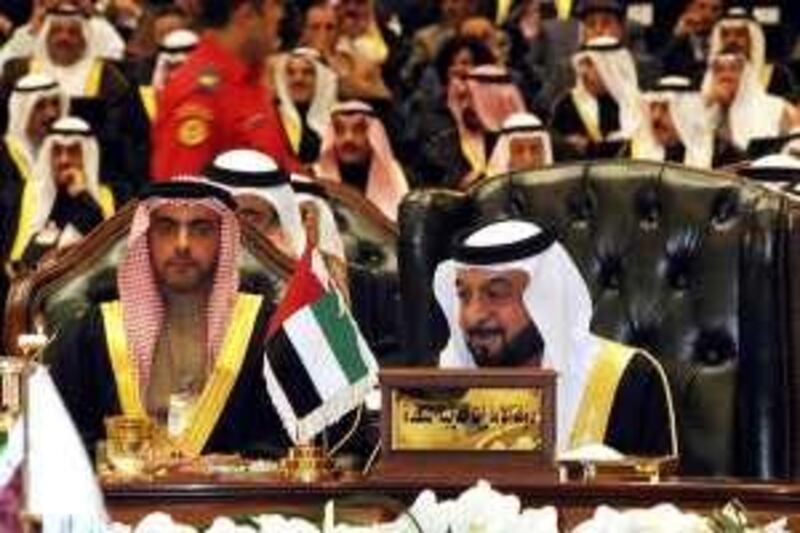KUWAIT CITY // Gulf leaders have agreed to establish a joint rapid response force because of the recent clashes between Saudi Arabia and Yemeni rebels, the secretary general of the Gulf Co-operation Council, Abdulrahman al Attiyah, said yesterday. Mr al Attiyah made his comments at a press conference after the GCC's annual summit, in which Gulf leaders discussed a wide range of political and economic issues.
"There is the defence council and there is the Jazeera Shield Force, and we have made a decision to establish a first intervention force," Mr al Attiyah said. "It is not meant to work on the Saudi borders, but to protect and defend any country of the GCC." Mr al Attiyah said the force would perform a different function from the Jazeera Shield Force, also known as the Peninsula Shield Force. "What has been happening recently proves that this will be one of the wings to support stability and security in the GCC countries."
The Peninsula Shield Force, which is made up of troops from Gulf countries and is based in Jeddah, was created in the 1980s to respond to military aggression against any member of the GCC. The Gulf Co-operation Council is a loose confederation of Bahrain, Kuwait, Oman, Qatar, Saudi Arabia and the UAE. Every year, the leaders of the six states meet to discuss issues of regional importance and ways to promote economic integration.
The GCC's secretary general and Kuwait's minister for foreign affairs, Sheikh Mohammed Sabah Al Salem Al Sabah, held a press conference for about 300 journalists who attended the summit on its final day. While answering a wide range of questions from foreign policy to oil, Sheikh Mohammed told reporters that the GCC is "not threatened by Iraq's plans to expand its oil production" in the next few years. Iraq has recently been offering contracts to develop its oilfields - some of the world's biggest - after years of neglect because of sanctions and war.
If Iraq's plans are completed, it could quintuple its current capacity to pump crude oil to more than 12 million barrels per day by 2015, rivalling the capacity of the world's largest oil producer, Saudi Arabia, which currently has a capacity of 12.5 million bpd. Mr al Attiyah had said before the summit that the matter of Dubai World's US$3.5 billion (Dh12.9bn) sukuk payment was not on the agenda, but the minister of foreign affairs used the press conference to offer support for Dubai.
Sheikh Mohammed said: "Once we heard the news about the financial crisis in Dubai, and when Dubai World announced the rescheduling of the debts, I called the Emirates' foreign minister - I offered to give support and everything he needs. "You have brothers in Kuwait and we are always supporting you," Sheikh Mohammed said to his counterpart. Another economic issue that topped the agenda was the Gulf's stuttering plan to create a unified currency.
Kuwait's finance minister, Mustafa al Shamali, said the GCC monetary union agreement, which has been ratified by four of the countries, came into effect during the summit. He said the Gulf's central banks will now agree to a timetable for the establishment of a central bank before launching the unified currency. The minister expressed hope that Oman and the UAE, which pulled out of the planned currency, would rejoin.
The summit's most concrete economic success came with the official launch of a major project to link the electricity networks of the six states. The $1.6bn grid will enable electricity producers to export power to other states and provide a reserve of power to all of them in case of emergency. The emir of Kuwait, Sheikh Sabah Al Jaber Al Ahmed Al Sabah, laid out the GCC's main foreign policy concerns in the summit's opening speech on Monday night, and the recent clashes on the GCC's southern border between al Houthi rebels and Saudi Arabia topped the list.
"Any violation of the security and stability of the brotherly kingdom of Saudi Arabia represents an aggression on all the security of the GCC countries," the emir said. "We support our Saudi brothers in all the actions they take to defend their sovereignty." Sheikh Sabah also called for "solving the Iranian nuclear crisis through dialogue and peaceful means". He expressed concern for terrorism in Iraq, hostility between rival factions in the Palestinian territories and called for the establishment of an independent Palestinian state with Jerusalem as its capital.
In the past, the GCC has been criticised for being a talking shop, with weak institutions and poor implementation of resolutions. But at the end of the summit, Sheikh Mohammed offered a rare glimpse of public introspection. "The course of the GCC is slow compared to the expectations of the people," he said. "We ask for miracles. "This overloads us with a lot of burdens and a lot of responsibilities. We are slow compared to the expectations of our people, but at the same time, compared to the other regional organisations in the East or in the West, we are running very fast," he said.
@Email:jcalderwood@thenational.ae





